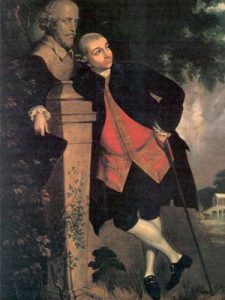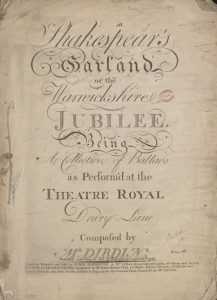250 years ago today, on Weds 6 September 1769, David Garrick’s Shakespeare Jubilee began in Stratford-upon-Avon, the first Festival celebrating Shakespeare in the world.
Even before it started there were many critics of the whole idea who were ready to jump on any failure immediately. The many accounts of the Jubilee written at the time mostly focussed on the disagreements, the inadequate planning, and the disastrous rain that prevented the most spectacular elements from taking place.
The successes, though, are rarely remembered. One element that has stayed important to local people is the song “Warwickshire Lad”, that was regularly sung at Shakespeare Festivals in Stratford and has been adopted as the Regimental March of the Royal Warwickshire Regiment. The words are given here, and here is the tune played as a quick march.
Music was an essential feature of the Jubilee, its first major event being a performance of Dr Arne’s oratorio Judith, performed in Holy Trinity Church at 11 and intended to give an air of seriousness to the Jubilee before the mood became celebratory. In readiness for the entertainment the town was full of musicians the evening before. One writer listed the names of well-known performers to be seen, noting that the town also contained “an incredible number of Flutes, Hautboys, Fiddlers, Guitars, Candle-Snuffers, Scene Shifters, and a numerous tribe of Attendance from both the Theatres”. The atmosphere in the town must have been like nothing that had ever been seen there before, with “every Inn, House and Hovel, now swarm[ing] with Company,… the Haylofts…being cleared for the Reception of Families of the first Credit… for want of better Accommodation”.
Much of the music composed for and played during the Jubilee was inspired by the revival of interest in early English songs, ballads and catches. Dr Arne was one of the most prominent composers to write these songs, and Garrick thought they would be appropriate for this event which was intended to appeal to a wide range of people. For the occasion, then, Garrick and several assistants wrote many songs, and he called on the composer Charles Dibdin to set them to music. Dibdin had already set A Warwickshire Lad and another song The Mulberry Tree, and became so exhausted by Garrick’s demands that he eventually decided not to go to Stratford at all.
This could have been one of those stories of things that went wrong at the Jubilee, but on this occasion there was a happy ending. Dibdin wrote in a letter that omitting part of his work “might not only do material injury to the scheme, but …might be so represented as to appear a meditated insult to the public”. So Dibdin arrived in Stratford on the evening before the Jubilee, setting the words for guitars and flutes. He then took some of those musicians aside, “made the musicians sit up all night, and as it was daylight, we sallied forth as a band of masqueraders, and to the astonishment of Garrick serenaded him with the very thing he had set his heart upon but which he had given up as lost”.
This musical beginning to his great Jubilee must have been a perfect start to the day. And it continued: Judith was beautifully performed, and at its end Garrick, carrying his mulberry wood wand and wearing his mulberry-wood medal, led the band in a triumphant procession to the Birthplace. As they went, the performers sang:
This is the day, a holiday! A holiday!
Drive spleen and rancour far away,
This is the day, a holiday! A holiday!
Drive care and sorrow far away.
That first day continued as successfully as it had begun, but the memory of it has been obliterated by what, sadly, was to follow.
- I’m indebted for much of the information in this post to Johanne M Stochholm’s book Garrick’s Folly.



